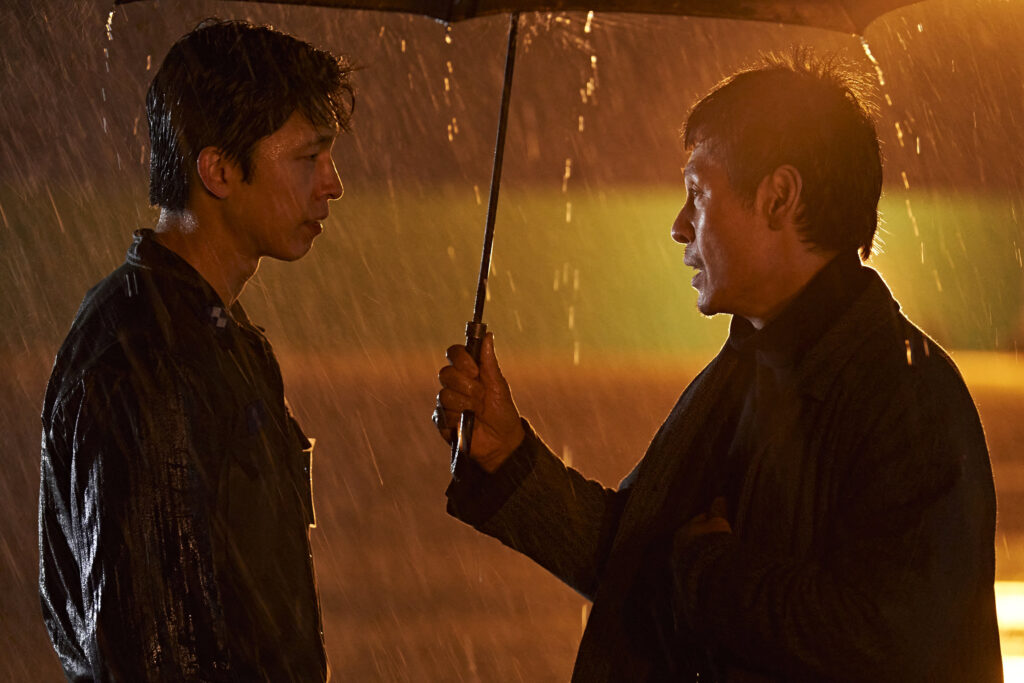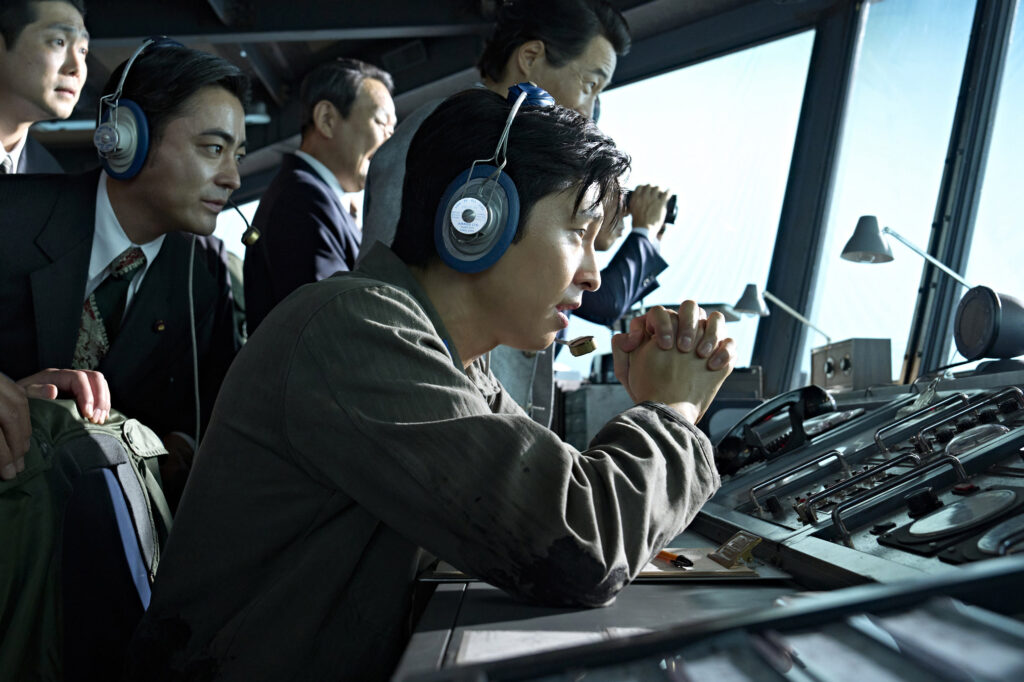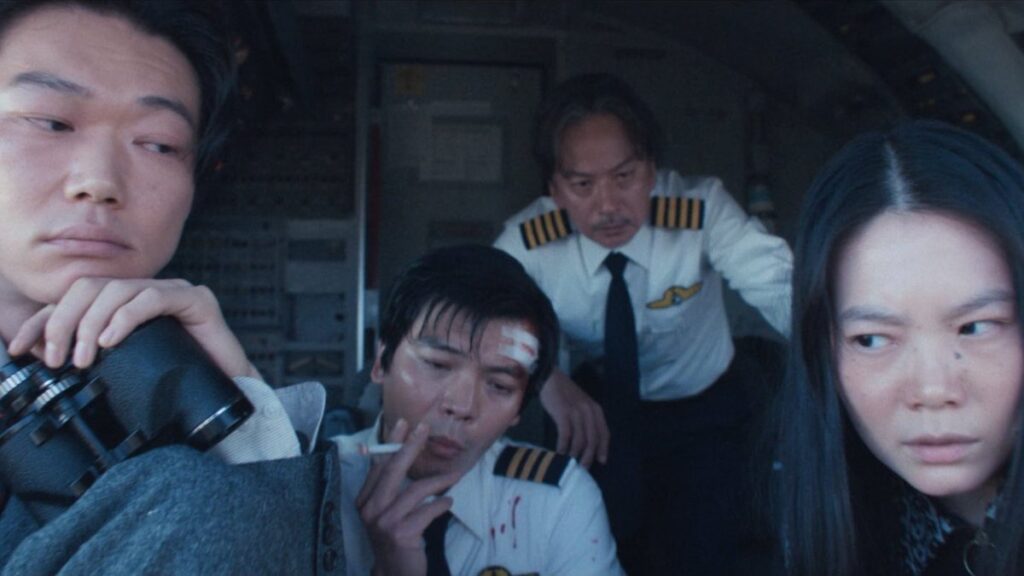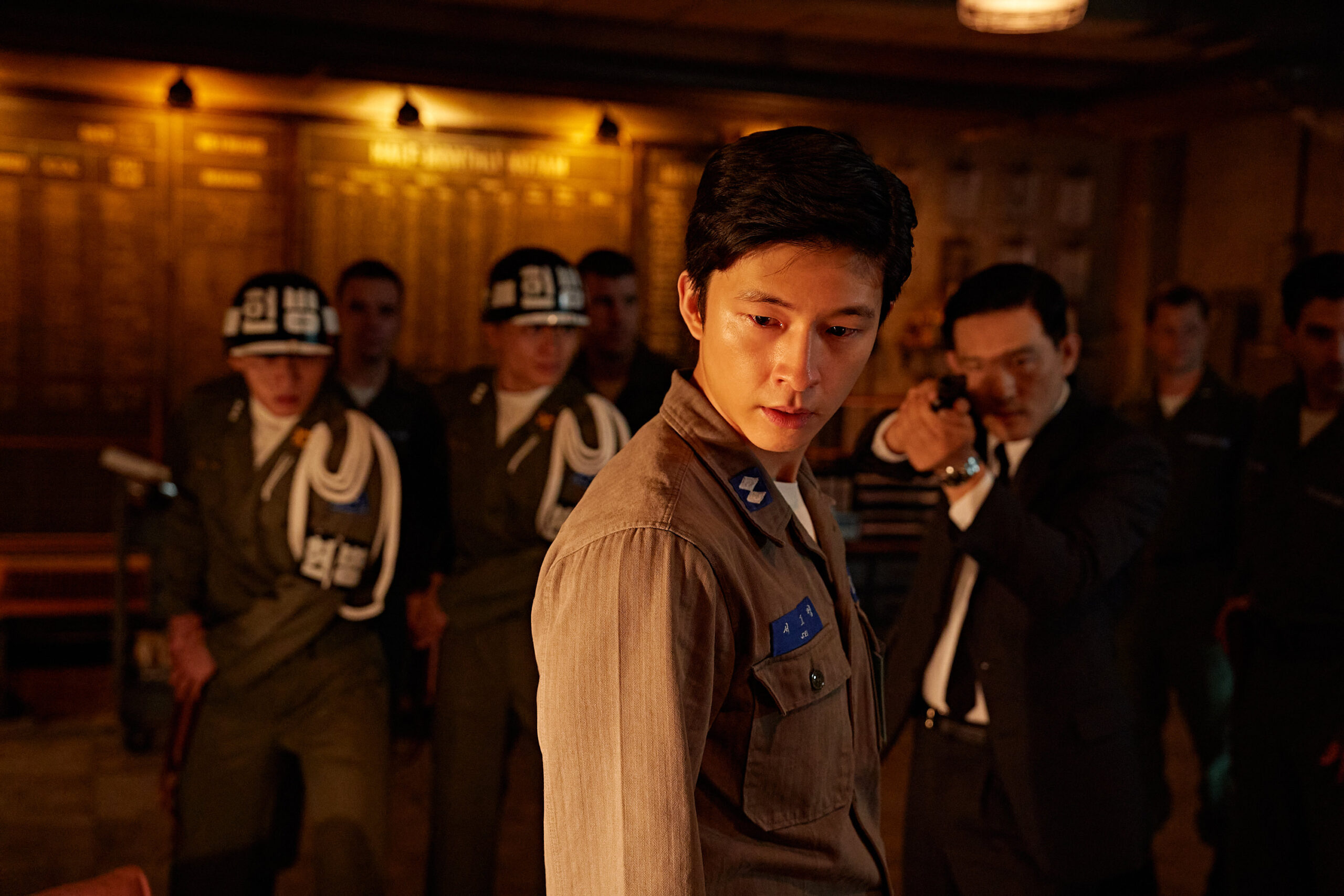Did you watch Good News?
Honestly, I kept thinking about Beomseok while watching this film. You know, our Beomseok from Weak Hero Class 1—impulsive and dangerous, yet so lonely and delicate. The one who toppled the canoe.
Hong Kyung became etched in our minds as Beomseok. But in Good News, he showed us a completely different kind of youth through Seo Go-myeong.
For those new here—I’m Jennie, and I analyse Korean dramas through cultural context and the hidden layers of language that subtitles can’t capture. I mainly cover Weak Hero, D.P., and the actors’ follow-up projects. Subscribe if you want to double your drama-watching experience.
Alright, let’s dive in.
When the Pomade Hair Falls Apart
What fascinated me most about Seo Go-myeong’s character? His hair. Seriously.
When he first meets Amugae, you see this perfectly slicked-back pomade hair—speaking three languages fluently with this slightly cocky expression. The elite air traffic controller. But as time goes on, that perfectly groomed hair gradually unravels.
The costume and props team really paid attention to detail. They did the same with Beomseok—his cardigan colours changed as the story progressed, from white to black.
Same with Go-myeong. As he gets pushed around and broken down by higher-ups who “spit out bitter and swallow sweet,” that neat pomade hair slowly falls apart. External details showing internal collapse.
When the Ambitious One Becomes the Most Desperate
Here’s what I loved most about Seo Go-myeong—This guy is pure ambition. He wants to climb, even fantasises about having his own statue erected. But by the end, he cares more than anyone about the lives trapped on that plane.
His legs shaking with anxiety, then running into the rain with nothing but determination. Hong Kyung captured that emotional whiplash beautifully.
The person who initially wanted to solve this terror incident for career advancement becomes genuinely desperate to save the people inside.

Why This Character?
Hong Kyung has said he’s drawn to characters with “heat, youthful recklessness, and a rebellious spirit.” Go-myeong had all of that. But there’s something deeper at play here.
“I try to pay attention to what different generations experience, especially those of us at the tail end of the millennial generation,” Hong Kyung explained in an interview.
“The news says we’re the generation having the hardest time, and our generation talks about it a lot too. We’re actually living through it—it’s not someone else’s problem. I’ve personally felt this on my skin. I don’t want to be cynical about these issues.”
That’s not just an actor talking about a role. That’s someone who sees his work as a form of generational testimony.
Different era, sure—but Seo Go-myeong also represents his generation in that way. That consistent conviction and belief. Hong Kyung wants audiences, regardless of generation, to find points of solidarity, hot-blooded messages, and various emotions that touch the heart—each with their own interpretation.
Disillusionment with the State, Yet Humanity Remains
Here’s why Seo Go-myeong is both cruel and beautiful as a character.
This man will feel profound disillusionment toward the bureaucrats, but he’s still a soldier who has to dedicate his life to the state. When he runs at the end, it’s not out of military loyalty—it’s a human individual’s judgment based on the eyes he saw in that hijacked plane. A decision made without calculating angles or interests. That’s something only someone in their twenties can do.
A judgment he dared to make on his own.
But the reality? He’s proven to be nothing more than a useful cog in a massive system.
Beomseok and Go-myeong: Youth Hungry for Status
Here’s what’s interesting—both characters Hong Kyung played are incredibly sensitive to status.
Remember Beomseok? Desperately wanting to be alpha. Sensitive to hierarchy. The moment he misunderstood being pushed lower than “some girl from the streets” between Suho and Si-eun, he completely darkened.
Beomseok constantly needed reassurance from Suho. He needed explicit validation from the group, needed to hear “you matter.”
Go-myeong’s the same. Thirsty for advancement and glory.
Amugae sees right through this young man and teases him—and isn’t Go-myeong’s situation something we all have inside us?
When you nail a presentation at work and get applause, somewhere inside you feel proud. But then your accomplishment becomes your boss’s achievement. Conversely, when things go wrong, blame gets transferred to you.
Unlike senior officials who’ve gotten old and only think about self-preservation, there’s that moment—what only youth in their twenties can do—running down that dark, rain-soaked runway following conviction.
Pitiful yet realistic, yet with a heart about to burst. Hong Kyung expressed that youth deliberately and well.
The Naked Face of Bureaucracy: Hierarchy’s Bitter Taste
The most bitter part of Good News? The senior officials.
The film uses dark comedy to expose bureaucratic incompetence and cowardly refusal to take responsibility. Ministers flee the terror scene, worried about blame.
Seo Go-myeong wears a gaudy gold watch—supposedly bestowed by the president but really just mass-produced tacky souvenir—the same kind his father received for losing both legs in the Korean War. He dreams of medals and becoming a hero, but it seems his fate is cannon fodder.

The Pattern Across Systems
This reminds me of what the Weak Hero directors said: “Adults’ wrongs make children bleed.”
Good News is the same. It’s always the lower-ranking workers who shed the most blood and sweat in any system.
When I watch directors tackle systemic injustice, I love seeing how actors portray youth getting used and exploited. In Good News, I enjoyed that cathartic moment when Go-myeong says “forget it all, I’m doing it my way” and just runs.
That’s a choice only youth can make.
The Jungle Kingdom
Director Han Jun-hee recalled his high school days as a “jungle kingdom”—that invisible competition between boys, everyone prepared to overturn everything if a fight broke out. Of course, as an artist, he might remember that fishy-smelling all-boys high school era uniquely, but I know well that hierarchy culture among men.
Even 80-year-old men at senior centers compete to be leaders. In rural communities full of elderly, they compete to be “village chief.”
But here’s the difference—in the high school jungle, at least friends try to protect each other. Like when Suho provokes Gil-su (who’s holding a knife) to protect Si-eun.
In bureaucratic society? The higher-ups use those below as shields and flee. They take the credit, push down the responsibility.
Mastering Three Languages: The Actor’s Professionalism
Hong Kyung’s performance as Go-myeong—his foreign language work was incredibly natural.
Go-myeong has exceptional qualifications to work at the US military RAPCON in the 1970s. An elite seeking success, speaking Korean, Japanese, and English fluently.
The Japanese especially impressed me. Director Byun Sung-hyun was surprised. Usually actors just memorize foreign lines by rote, but Hong Kyung started studying Japanese from scratch.
Why? “Because I wanted to hear and feel what my scene partners were saying.”
Just like when he learned sign language for Hear Me, Hong Kyung doesn’t just memorize lines—he tries to understand the language itself. Starting with hiragana, meeting with Japanese, English, and air traffic control teachers three times a week.
“If I can’t do this properly, I have nowhere to hide, so I paid attention to every nuance,” he said.
So when you watch the film, it doesn’t feel like “acting”—it sounds like real language someone’s been speaking their whole life.
Running into a Hijacked Plane
What Go-myeong showed at the end was a burning heart.
The scene where he enters the hijacked plane to persuade terrorists. Moving as your burning heart commands—isn’t that youth’s privilege?
Hong Kyung said:
“Being able to close my twenties with this project means a lot. Good News contains my youth. I captured what I’ve been chasing since my twenties, and poured out all the burning power of my twenties. I don’t know how long I’ll act, but this is definitely a fingerprint I’ve left—crystal clear.”
Fingerprint.
Such a powerful expression. And it makes sense coming from someone who refuses to be cynical about his generation’s struggles. Someone who believes in solidarity across generations through hot-blooded messages that touch the heart.
The Real Yodo-go Incident: When Korea Became “North Korea” for a Day

Before we wrap up, let’s talk about the historical event that inspired this film.
On March 31, 1970, Japan Airlines Flight 351 (the Yodo-go) was hijacked by nine members of the Japanese Red Army. They demanded to go to North Korea. But here’s where it gets wild—the plane was running out of fuel and had to land at Gimpo Airport in Seoul.
The Most Absurd Operation in History
With only 30 minutes before the plane landed, South Korea pulled off the most bizarre operation imaginable. They took down every Korean flag, every UN flag, and raised North Korean flags at Gimpo Airport.
At the height of ideological conflict between North and South Korea, the North Korean flag was hoisted on South Korean soil for the first time in history. It’s both darkly comedic and tragic.
Korean special forces dressed in People’s Army uniforms. Local residents were given bouquets of flowers. US military withdrew from sight. It was a complete tearful charade.
Air traffic controller Chae Hope-seok continued pretending to be a North Korean controller, successfully landing the Yodo-go at Gimpo.
When Everything Fell Apart
But the Red Army hijackers refused to leave the plane. They were deeply suspicious. Some claimed they saw American soldiers. They kept demanding Kim Il-sung’s portrait, then North Korean newspapers.
Then, absurdly, the Red Army leader asked a soldier standing by the plane: “Here Seoul?”
The soldier innocently answered: “Yes.”
Busted.
The Three-Day Standoff
From that moment, it became South Korea vs. the Red Army hijackers. They were in a standoff for three days.
The South Korean government had experienced a previous incident where a Korean passenger plane was hijacked by a spy and taken North. So they were adamant: this plane was NOT going to North Korea.
“Release the passengers first, then we’ll let you go.”
The hijackers threatened to blow themselves up and refused.
Eventually, Japan’s Vice Minister of Transport flew to Korea and exchanged himself for the passenger hostages. The Yodo-go flew to Pyongyang, and North Korea accepted the Red Army’s asylum.
The Bitter Punchline
Here’s the (not) funny part: the Red Army’s guns and bombs were fake. Complete fakes.
And here’s the tragic part: While the Japanese pilots and the Vice Minister who returned to Japan became national heroes, Korea’s response to its own people was utterly shameful.
Three days after the Yodo-go incident, air traffic controller Chae Hope-seok received a call from Air Force headquarters: “Do not speak about the Yodo-go incident. If you open your mouth, we’ll shoot you.”
The Ministry of Defense report completely deleted Chae’s contributions and attributed everything to “the Japanese pilot’s independent judgment.”
The Erased Hero
Chae Hope-seok took off his military uniform a year later. A promising young man in his twenties who had even obtained a US Federal Aviation Administration air traffic controller’s license—his dreams crushed by his own country.
Unable to tell anyone about this incident, he spent years drowning his life in alcohol. He didn’t even tell his wife until he turned 63.
This is the real story behind Good News. A young man who did everything right, yet was erased from history by the system he served.
Sound familiar?
What to Expect from His Thirties
With this project, Hong Kyung’s twenties are over.
Just like when we watched Choi Hyun-wook’s Suho in Weak Hero and wondered “how far will this actor go?”—I’m so curious about Hong Kyung’s thirties.
Hong Kyung, who left such a deep impression as Beomseok, who closed out his twenties with Seo Go-myeong—what faces will this promising actor show us next?
We’re following his career now. After military service, what fingerprint will he leave next?
Closing Thoughts
If you haven’t watched Good News yet, you should.
You can feel the last flame of Hong Kyung’s twenties. Ambition, disillusionment with systems, and yet—the burning humanity that remains.
And now you know the real story behind it. A story about a young man whose heroism was buried by bureaucrats worried about saving face.
Some things never change across generations, do they?
Leave comments telling me what you think.
The Deluluverse
Okay, the canoe trio, Speaking of which… Asuka and I started discussing whether the canoe trio could realistically maintain their friendship as adults post-coma. That conversation evolved into a mid-length fictional arc series.
Asuka confessed something hilarious:
“I’m not a shipper, and I realize the mortifying irony of having mapped out a deluluverse with several thousand words in recent days. For this I can only offer Beomseok’s defence: ‘I don’t know why I did it.’ But no award-winning tear is going to flow out of my eye. Because I’m gonna do some more.”
Our arc isn’t just fiction—it includes deep character analysis and philosophical themes we couldn’t fit into YouTube videos. Started as a joke between Asuka and me, but it’s grown into something we both keep coming back to. I’m the bricklayer adding local flavor while Asuka simmers the fictional arc soup.
⛔️ Copyright Disclaimer: All drama footage, images, and references belong to their respective copyright holders including streaming platforms and original creators. Materials are used minimally for educational criticism and analysis with no intention of copyright infringement.
🚫 Privacy Policy: This site follows standard web policies and does not directly collect personal information beyond basic analytics for content improvement. We use cookies to enhance user experience and may display advertisements.

답글 남기기